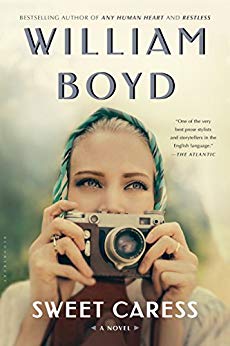Bloomsbury,
2015
I’ve
been a fan of William Boyd’s novels for many years, entranced by
his vivid, clever prose and deeply appreciative of his multi-layer
plotting. Many of his heroes, though, in particular the protagonists
of Waiting for Sunrise and Ordinary Thunderstorms, have
struck me as almost pathologically bland, aimless and unreflective.
Thus, I was surprised and delighted by Amory Clay, the heroine of
this pseudo-autobiography.
Amory
is passionate, contrary, even a bit wild, yet from her earliest days
possessed of an astonishingly perceptive sense of herself. Sweet
Caress follows her from her birth in Edwardian England, through
her childhood in the English countryside with her emotionally distant
mother, mentally-ill father, musically gifted sister and autistic
brother, to her teenage years when she discovers her vocation as a
photographer. Amory never seems to doubt herself or her impulses. She
recounts her stint in perverse and impoverished post-WWI Berlin,
cataloging the hidden world of whores and cabaret performers; her
near-fatal attempt to photograph British fascists in the thirties;
her perilous work in the combat zone during World War II and the
Vietnam War; her love affairs with her married publisher, a neurotic
French author, and the battle-ravaged Scottish lord she finally
marries. Through excerpts from a present day diary, written as she
approaches seventy, plus her reminiscences, Amory shares her fears,
frustrations, joys and meditations. Her lively account, illustrated
with her black and white photos from each period, feels so genuine,
that I actually had to go to the Internet to confirm that she was
not, in fact, a real person.
I
was sincerely disappointed to discover she is entirely fictional. At
the same, I was astonished by Boyd’s virtuosity in bringing her to
life.
There’s
no plot in one person’s history, only a series of episodes. That’s
true of this novel as well. Furthermore, we edit our memories when we
recall our past. Amory is fully aware of this tendency. Reading Sweet
Caress, we have a dual view of the protagonist’s life—her
recollections of her feelings when she was young, paired with her
current understanding of her more youthful self. We recognize that
she’s selecting the highlights, the turning points that defined who
she was and who she became.
Boyd
pulls this off flawlessly, making it seem easy. Amory drew me in,
showed me her world through her brilliant photographer’s eyes, made
me believe in and care about her.
I
was deeply impressed.

No comments:
Post a Comment
Let me know your thoughts! (And if you're having trouble commenting, try enabling third-party cookies in your browser...)